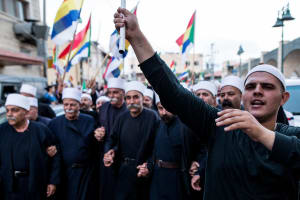Netanyahu demands ‘full demilitarization of southern Syria,’ vows to protect Druze community
UN envoy demands Israeli withdrawal: 'No argument' for IDF remaining in Syria

With the IDF still occupying a buffer zone in southern Syria, Prime Minister Benjamin Netanyahu went a step further on Sunday and demanded that the new Syrian government commit to keeping its forces out of southern Syria.
“We demand full demilitarization of southern Syria from the forces of the new regime. Also, we will not tolerate any threat to the Druze community in southern Syria,” Netanyahu said during a speech at the graduation ceremony for new IDF combat officers.
“In Syria, the IDF will remain in the Mount Hermon area and the buffer zone for an indefinite period, to protect our settlements and prevent any threat. We will not allow the forces of Hayat Tahrir al-Sham or the new Syrian army to enter the area south of Damascus,” he vowed.
After the collapse of the Assad regime, which was spearheaded by the Islamist terror group Hayat Tahrir al-Sham and its leader Abu Muhammad al-Jolani, who now goes by Ahmad al-Shara, the IDF captured a buffer zone along the frontier with Syria.
“The collapse of the Syrian regime created a vacuum on Israel’s border and in the buffer zone established by the 1974 Separation of Forces Agreement,” Netanyahu’s office said at the time. The prime minister said that Israeli forces would remain in that location “until security on our border can be guaranteed.”
After Netanyahu's speech, Defense Minister Israel Katz stressed that Israeli security forces would keep scanning the entire area for threats.
“We are committed not to allow a return to the reality of October 7, and that will be the case,” Katz said.
“There is a new reality in southern Syria, as the Prime Minister noted. The IDF will not allow hostile forces to establish themselves and operate in the security zone in southern Syria, from here to Damascus, and we will act against any threat.”
Katz also mentioned efforts to deepen ties with the Druze population in Syria, which dominates the southern province of Suweida.
“We will strengthen our ties with friendly populations in the area,” Katz added, “with an emphasis on the Druze population, which is a sister population to our Druze brothers, who fight alongside us in the State of Israel. We are committed to allowing them to maintain contact with their relatives and their partners in the glorious history of the Druze community.”
The IDF established several forward posts in Syrian territory, the most prominent of which is located on the summit of Mt. Hermon.
Relations between Israeli troops and local villagers in the Syrian Golan Heights have been largely calm, but tensions have emerged in some areas where residents protested the Israeli incursion.
Syrian media reported that several villagers were wounded by Israeli fire, while the IDF stated that its forces only used fire to disperse crowds approaching Israeli soldiers.
Israel’s incursion has drawn criticism from the new Syrian government and the United Nations.
Geir Pedersen, the UN special envoy to Syria, said he was still concerned about Israel's actions last week.
He claimed the new government was addressing security concerns, saying, “There is, in my opinion, no argument for why the Israelis should be staying.”
“The solution is very simple. The Israelis need to withdraw,” Pedersen said.

The All Israel News Staff is a team of journalists in Israel.
You might also like to read this:

















